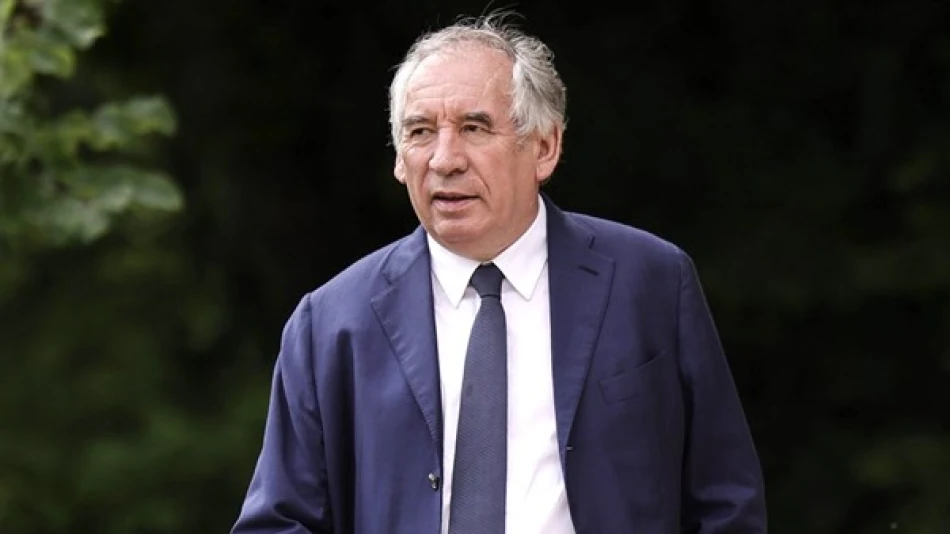
French PM to Seek Parliament's Confidence Vote: A High-Stakes Political Showdown
France's Bayrou Gambles Political Future on Austerity Budget as Opposition Circles
French Prime Minister François Bayrou announced Monday he will call a confidence vote in parliament on September 8, staking his government's survival on securing support for a controversial austerity budget that proposes slashing spending by over €40 billion. The move puts Bayrou's fragile coalition on a collision course with both left-wing and right-wing opposition parties, setting up a potential constitutional crisis that could paralyze Europe's second-largest economy.
A High-Stakes Parliamentary Showdown
Bayrou's decision to voluntarily trigger a confidence vote represents a calculated political gamble designed to force lawmakers into backing his fiscal consolidation plan. The Prime Minister is essentially daring opposition parties to bring down his government over budget cuts that his administration argues are necessary to restore France's fiscal credibility.
The proposed €40 billion spending reduction has already drawn fierce criticism from across the political spectrum. Left-wing parties denounce the cuts as an assault on France's social model, while right-wing opposition groups question whether the reductions go far enough to address the country's mounting debt burden.
France's Fiscal Reckoning
The budget battle comes as France grapples with a deficit that has ballooned to approximately 6% of GDP, double the European Union's 3% limit. This fiscal deterioration has put Paris on a collision course with Brussels, which has already initiated excessive deficit procedures against France.
Bayrou's austerity push mirrors similar fiscal consolidation efforts across Europe, but the scale of proposed cuts reflects the severity of France's budgetary crisis. Unlike Germany, which maintained fiscal discipline through recent crises, or Italy, which has gradually reduced its deficit, France faces the uncomfortable reality of implementing painful cuts during a period of economic uncertainty.
Market Implications and Investor Concerns
Financial markets are closely watching the confidence vote, as political instability could trigger a renewed spike in French borrowing costs. The spread between French and German government bonds has already widened in recent months, reflecting investor concerns about the country's fiscal trajectory and political stability.
A failed confidence vote would likely send shockwaves through European markets, potentially rivaling the turbulence seen during Italy's frequent government crises. For investors, the September 8 vote represents a crucial test of France's ability to implement necessary but unpopular reforms.
Echoes of Past Political Crises
Bayrou's survival of a no-confidence vote in July demonstrates the precarious nature of his parliamentary position. The Prime Minister leads a minority government that depends on the tacit support of opposition parties unwilling to trigger fresh elections that could further fragment an already divided National Assembly.
This political configuration recalls the unstable coalitions of France's Fourth Republic, when governments regularly fell over budget disputes. However, the current crisis carries higher stakes given France's central role in the European project and its influence on continental economic policy.
The European Dimension
France's budget crisis extends beyond domestic politics, potentially undermining European Union fiscal rules and the stability of the eurozone. As one of the EU's founding members and largest economies, France's inability to control its deficit could embolden other member states to ignore Brussels' fiscal guidelines.
The confidence vote will also test President Emmanuel Macron's political legacy, as the budget reflects his administration's broader economic strategy. A government collapse would likely force Macron to appoint a new prime minister and potentially abandon key reform initiatives, leaving France's structural economic challenges unaddressed.
The September 8 vote will determine whether France can implement the fiscal discipline demanded by markets and European partners, or whether political gridlock will perpetuate the country's budgetary drift. The outcome will reverberate far beyond French borders, influencing European fiscal policy and potentially reshaping the balance of power within the EU.
Most Viewed News

 Layla Al Mansoori
Layla Al Mansoori






